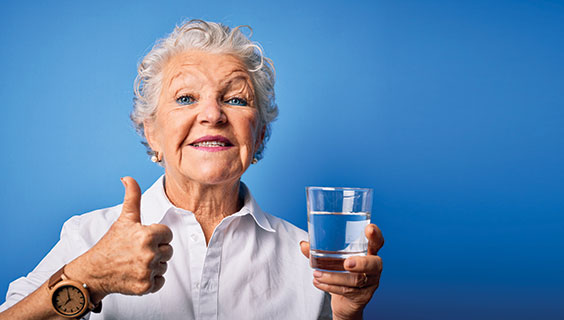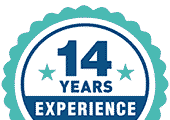Water is what sustains all life on earth and approximately 70% of the human body is made up of water. Water helps regulate body metabolism, circulation, and helps blood transport oxygen and other essential nutrients throughout the body. We gain fluids by eating and drinking and lose fluids through urination and sweating, and when we lose more fluid than we take in, then we become dehydrated.
Unfortunately, dehydration is a common problem for seniors and when left untreated can quickly lead to tiredness, confusion, urinary tract infections, and even more serious health conditions. People who suffer from Alzheimer’s are at higher risk because dehydration can lead to dizziness, falls and accidents, and a noticeable increase in memory problems and confusion.
Why Are Seniors At Higher Risk For Dehydration?
The reason that dehydration is a risk to seniors is that as the body ages, it gradually loses its ability to hydrate properly and becomes less aware of the sense of thirst. Other reasons for dehydration in seniors can include a reluctance to drink more often due to urinary incontinence, mobility issues that make it difficult to get a drink or memory issues such as forgetting to ask for a drink. Some medications can also have side effects that can cause dehydration.
Symptoms of Dehydration
- Feeling confused
- Dizzy or lightheaded
- Loss of balance
- Fatigue
- Dry mouth
- Higher than normal heart rate
- Dark yellow and strong-smelling urine
- Less frequent urination (Less than 4 times a day)
- Pinched skin does not bounce back right away (The Pinched Skin Test)
How to Tell if You’re Dehydrated – The Pinched Skin Test
One easy way to tell if you are dehydrated is the pinched skin test. Use two fingers to pinch some skin on the back of your hand, hold for 3 seconds and then let go. The skin should quickly bounce back to normal. If it takes a moment or seems longer than usual for the skin to return to normal then you might be dehydrated. This is because normal hydrated skin is more elastic and bounces back to normal quickly while dehydrated skin is often wrinkled and has less elasticity.
How Much Water is Enough?
The best way to avoid dehydration is to continuously drink water throughout the day. The general recommendation is to drink at least eight 8 oz. glasses of water although everyone’s daily water intake is different depending on their size, age, weight, and activity level. For example, you may need to drink more water if you live in a hotter climate, exercise frequently, and sweat heavily.
5 Tips for Avoiding Dehydration in Seniors
- Drink Often
– Keep water close by so it is in easy reach
– Little sips throughout the day often work better than trying to drink a whole glass all at once - Build A Habit
– Create a drinking schedule that includes a morning, afternoon, and evening drink
– Always drink a full glass of water with medications - Drink Healthy
– Smoothies, Ensure, protein, and sports drinks with electrolytes are healthy ways to get hydrated
– Note: Alcoholic beverages, Coffee, and Tea have a diuretic effect which increases the loss of water through urination so these drinks do not count towards proper hydration
– Note: Fruit juices are not a good option as they often have high amounts of sugar - Soups
– Soup is a great way to increase fluid intake
– Note: Sodium can cause high blood pressure so look for healthy low sodium soup - Fruits and Vegetables
– Lettuce is 96% water
– Zucchini and Celery is 95% water
– Watermelon and other melons are 90% water
It’s always best to talk to a doctor about the right amount of water for someone as some types of medical conditions such as heart or kidney disease may require patients to limit their water intake. And, always seek medical attention immediately if you suspect signs of severe dehydration.
Assisted living communities often have health programs that monitor residents and keep them hydrated, healthy, and active throughout the day. If you are interested in learning more about personal health programs for seniors and more about assisted living in Los Angeles contact us.
Call Ron Passaro at 310-428-8221.
We specialize in assisted living in Los Angeles and will guide you through the entire process – all at no cost to you.


